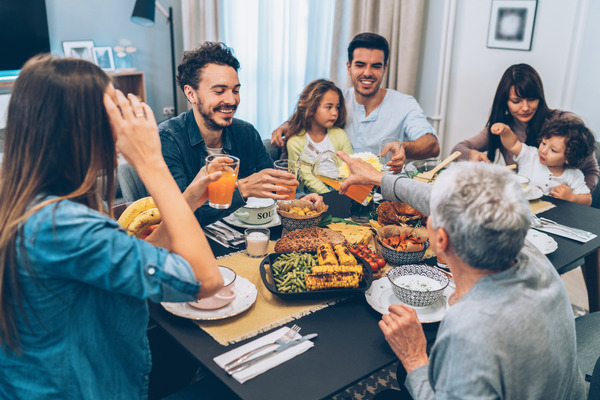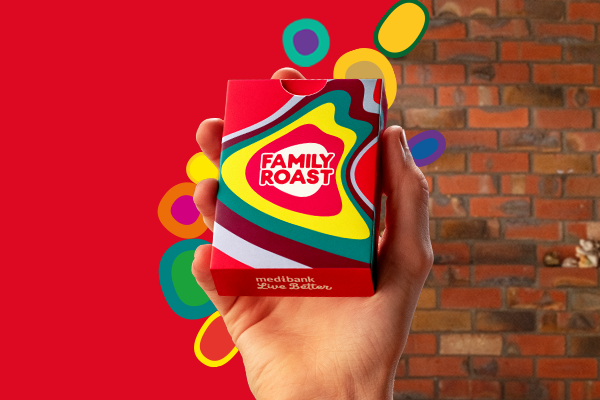If someone asked me to describe my day on a plate, you’d find most of my meals don’t involve a plate at all.
First up, breakfast: a large skinny flat white drunk from my reusable coffee cup (when I remember to bring it) as I make my way to the train station.
Lunch: some kind of bread product. Judging by the crumbs on my keyboard, also not involving a plate and eaten at my desk as I power through my workload.
Dinner, however, does usually involve utensils and is shared at the table with my family. Because we’re busy like most people, it’s a quick affair, often involves a food fight (my 4-year-old refuses to eat) and sadly, it’s not always the relaxing family gathering I like to think it is.
Looking at my day on a plate, it comes as no surprise to me that a 2017 study1 conducted by The Big Lunch in conjunction with the University of Oxford revealed the average adult eats nearly half of their weekly meals alone.
And although eating alone might feel typical for us now, it wasn’t always the case.
Food as ritual
Sharing meals has always been part of our human story. In fact, the saying “to break bread together” is as old as the Bible and highlights the power of food to build relationships and promote a sense of community.
In some cultures, the sharing of food is even a way to let those who have left us know they are not forgotten. Ever travelled to Thailand and noticed the offerings of food at grave sites?
But despite the clear connection between social eating and social bonding, in recent years, the simple act of sharing a meal is becoming less and less the norm.
And while mealtimes were the glue that once held communities together in the past, the University of Oxford study also revealed nearly 70% of respondents had never shared a meal with a neighbour, and 37% had never shared a meal with a local community group.
Convenience vs community
So, who’s to blame? Food delivery apps? Maybe. Our fast-paced lifestyles? Almost certainly. Our convenience culture combined with our busy lifestyles mean we often opt for quick and cheap rather than socially satisfying. We eat breakfast on the go, grab lunch at our desks and even order in our favourite restaurant meals rather than booking a table with friends.
But this trend towards solo dining goes against what we know leads to better wellbeing. According to the same University of Oxford study mentioned above, the more people eat with others, the more likely they are to feel happy and satisfied with their lives.
Families that eat together…
Ok, the family roast has its benefits. But for many of us parents (and I’ll put my hand up here) preparing the nightly dinner can sometimes feel like just another chore to tick off at the end of a long day. However, it’s worth carving out that time and prioritising the family meal on our to-do lists.
Regular shared meals give everyone the chance to come together to connect, which can strengthen relationships between family members. For kids and teens especially, it can provide a safe space to talk about their day and feel heard. For adults, it's a moment to pause and a chance to decompress and share the load, even if it’s just by laughing at the day’s chaos over a bowl of spaghetti. So next time you’re wondering what’s for dinner, remember it’s less about what’s on the table and more about the conversation around it. And don’t stress, it doesn’t have to be perfect — it just has to happen.
Connection is food for the soul
Connecting with others is good for us. Some of the benefits of fostering healthy connections with loved ones include lower rates of anxiety and depression, higher self-esteem, and building stronger, more trusting, and cooperative relationships over time.
Chatting over a lamb casserole, passing the salad and asking, “how was your day?”, these simple moments of sharing food are when real human connection can happen. And in a world that’s becoming increasingly busy and digitally driven, these opportunities to connect in real life matter more than ever.
Whether it’s with family, friends, neighbours or colleagues, the benefits of sharing a meal go way beyond what’s on our plate. It’s not just about the food – it’s about making time to have meaningful conversations with our loved ones, to nourish the relationships that fuel our mental wellbeing. I’m not suggesting every meal needs to be a communal event (we all need our alone time), but making regular time to cook a family roast, share a casual lunch or invite someone over can have a lasting impact on your mental and emotional heath.
We often think of food as fuel for our bodies, but it’s also a powerful way to fuel our connections, our sense of belonging, and ultimately, our happiness. So, next time you’re planning a meal, remember, it’s not just the food that matters, it’s the people you share it with.
READ MORE: How to practice active listening


